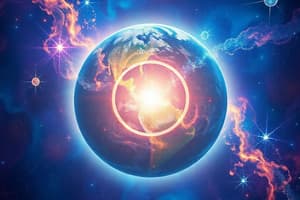Podcast
Questions and Answers
What is cosmology?
What is cosmology?
The study of the origin, development, structure, history, and future of the entire universe.
What theory explains the origin of the universe based on Edwin Hubble's observations?
What theory explains the origin of the universe based on Edwin Hubble's observations?
Big Bang Theory
Which of the following models includes the idea that Earth is motionless and everything revolves around it?
Which of the following models includes the idea that Earth is motionless and everything revolves around it?
- Newtonian Universe
- Heliocentric Model
- Big Bang Theory
- Geocentric Model (correct)
What did Pythagoras believe about celestial bodies?
What did Pythagoras believe about celestial bodies?
The Big Bang Theory suggests that matter was present at the beginning of time.
The Big Bang Theory suggests that matter was present at the beginning of time.
Who proposed the initial Big Bang Theory?
Who proposed the initial Big Bang Theory?
The __________ Universe theory states that the universe expanded but did not change its density.
The __________ Universe theory states that the universe expanded but did not change its density.
What major concept did Edwin Hubble contribute to cosmology?
What major concept did Edwin Hubble contribute to cosmology?
According to Einstein's Theory of General Relativity, the universe is:
According to Einstein's Theory of General Relativity, the universe is:
What cyclical concept involves both the Big Bang and Big Crunch?
What cyclical concept involves both the Big Bang and Big Crunch?
Who suggested the idea of an infinite multitude of star systems?
Who suggested the idea of an infinite multitude of star systems?
Flashcards
Geocentric Model
Geocentric Model
Earth is at the center of the universe, and everything revolves around it.
Heliocentric Model
Heliocentric Model
The sun is at the center of the solar system, and planets revolve around it.
Big Bang Theory
Big Bang Theory
The theory that describes the universe expanding from a hot, dense singularity.
Steady State Universe
Steady State Universe
Signup and view all the flashcards
Oscillating Universe
Oscillating Universe
Signup and view all the flashcards
Inflationary Universe
Inflationary Universe
Signup and view all the flashcards
Multiverse Theory
Multiverse Theory
Signup and view all the flashcards
Cosmology
Cosmology
Signup and view all the flashcards
Big Bang Singularity
Big Bang Singularity
Signup and view all the flashcards
Expanding Universe
Expanding Universe
Signup and view all the flashcards
Copernicus
Copernicus
Signup and view all the flashcards
Study Notes
Origin of the Universe
- Cosmology investigates the universe's origin, development, structure, history, and future.
- Different theories have emerged over time to explain how everything came into being.
Historical Development of Theories
-
Religious Cosmology:
- Genesis: Describes God's creation of light, darkness, earth, and living creatures in six days.
- Rigveda: Presents the universe as brahmanda or "cosmic egg," originating from Bindu and undergoing cyclical expansion and contraction.
-
Philosophical Views:
- Anaxagoras: Proposed a primordial universe created by "nous" or mind.
- Leucippus and Democritus: Introduced the atomic universe, consisting of atoms and void.
- Pythagorean Model: Suggested that celestial bodies orbited an "invisible fire," not the sun.
- Aristotle's Theory: Advocated for the four elements and a geocentric model with Earth at the center, supported by Eudoxus.
Models of the Universe
- Geocentric Model: Proposed by Aristotle and Ptolemy; Earth is motionless at the universe's center with celestial objects revolving around it.
- Heliocentric Model:
- Copernicus (1543): Rejected geocentrism, placing the Sun at the center.
- Giordano Bruno (1584): Extended the idea to consider many star systems.
Scientific Developments
- Sir Isaac Newton: Formulated laws of motion; described a static, infinite universe that was gravitationally balanced yet unstable.
- René Descartes: Proposed a static universe filled with swirling matter, influencing concepts of gravitational effects.
- Albert Einstein: Developed the Theory of General Relativity, initially considering a static universe.
- Edwin Hubble: Demonstrated in 1929 that the universe is expanding via observations of galactic redshift.
Modern Theories of the Universe
-
Big Bang Theory:
- Proposed by Georges Lemaître in 1927; explains that the universe expanded from a singularity approximately 14 billion years ago.
- Supported by Edwin Hubble’s findings of an expanding universe.
-
Steady State Universe:
- Introduced by Fred Hoyle, Thomas Gold, and Hermann Bondi; suggests that new matter is continuously added to maintain consistent density as the universe expands.
-
Oscillating Universe:
- Concept of expansion followed by contraction, leading to repeated cycles of Big Bang and Big Crunch.
-
Inflationary Universe:
- Alan Guth's model incorporates an early phase of exponential cosmic inflation to address gaps in the Big Bang theory.
-
Multiverse Theory:
- Developed by Andrei Linde; proposes the existence of multiple, potentially infinite, universes beyond our known cosmos.
Studying That Suits You
Use AI to generate personalized quizzes and flashcards to suit your learning preferences.




